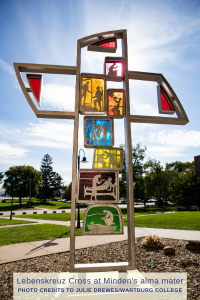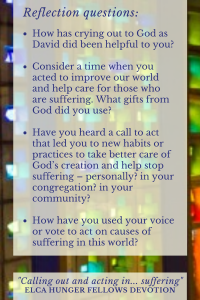By Kyle Minden, ELCA Hunger Advocacy Fellow*
David is calling out to God in Psalm 86 to protect him from his enemies and from the other dangers he faces. David humbles himself before God and asks for deliverance from persecution and suffering. There are a lot of passages in Scripture that point to this sort of response to the prospect of suffering – and for good reason. We should reach out to God when we face obstacles and burdens.
TEXT Psalm 86 – “…You are my God; be gracious to me, O Lord, for to you do I cry all day long…” (v. 2-3)
Like most of us, I have reached out to God many times over the past year to help me wrestle with grief, stress and exhaustion. That helps. But I think if you only read Psalm 86, you may get an incomplete picture of responses to the challenges and tragedy we face in our world today. Faced with suffering, Jesus acted.
Jesus in the presence of suffering
The Christmas story, for example, tells us of a time when the people of God were waiting anxiously for their deliverance. God’s people, having suffered through slavery, exile and persecution, called out to God for a Messiah. But when Jesus arrived, their Messiah wasn’t necessarily what people were expecting. Jesus was not a mighty king who would slay their enemies and eradicate suffering for God’s people. Jesus instead came as a teacher and a healer. Jesus healed and taught God’s followers to also look out for those who were poor, sick or on the margins of society.
I think we all have a tendency to depend on God’s ability to protect and heal, but we may skim over Jesus’s instructions for how we should all look out for each other. When there is suffering, we should call out to God for comfort and deliverance from suffering, but we must also act for those suffering as well.
A natural disaster is a tragic event that requires our prayers and laments to God. But reversing the ongoing climate crisis is a vital step to mitigate future disasters. After a school shooting, “thoughts and prayers” are only one side of a coin; following Jesus’s call directs us toward policy to help prevent future bloodshed. During this COVID-19 pandemic, we should call out in anguish to God; we truly need our faith in these trying times. But we must also do our part by wearing a mask, staying physically distanced and providing adequate funding and support including for frontline workers, scientists and healthcare systems.
Gifts and tools
I firmly believe that God’s guiding hand leads us out of tragedy, comforts us in our grief and even defends us against the burdens we cannot see. But we cannot call out to God for help without also utilizing the gifts and tools God has already given us to make change.
God gave us the scientists who plead with us to wear masks. God gave us climate change researchers of its causes and prevention. These are only a few examples. God has given each of us unique gifts and talents to make our world a better place.
Equipped with our gifts and tools, we must respond to Jesus’ call. We may cry out, but we need not only stand by and wait for God’s intervention. Followers of Christ must also act.
* This New Year Devotional Series has been composed by the three ELCA Hunger Advocacy Fellows serving in 2020-2021. “The ministry of ELCA World Hunger involves young adult engagement in conversations and formulating solutions to this systemic and universal obstacle to physical and spiritual well-being. Hunger is one of the key issues we must address as a church, for injustice and inequity are consistent themes across our local and global food systems. One way to address hunger and ensure young adult involvement in the ELCA and in World Hunger’s faith-based work is by funding the Hunger Advocacy Fellowship (HAF) position, a year-long contract position designed to cultivate the leadership of individuals looking to halt the expanding reach of hunger through advocacy,” describes Taina Diaz-Reyes, Hunger Advocacy Fellow in D.C.
Kyle Minden is the Hunger Advocacy Fellow at Lutheran Office for Public Policy in Wisconsin. He graduated from Wartburg College with a Bachelor of Arts in Religion and Business Administration and a Minor in Social Entrepreneurship. His interests in advocacy come from a desire to address systemic problems like poverty and hunger, income inequality, immigration reform and criminal justice reform. Growing up in the ELCA has taught him the importance of service as a demonstration of faith. He hopes to go to law school and become an attorney for the public interest following this fellowship.
